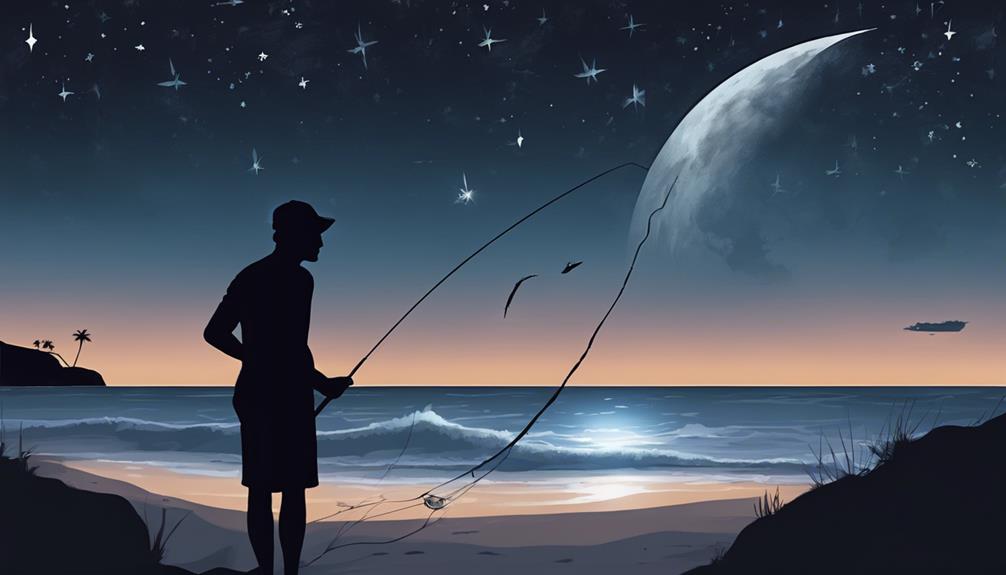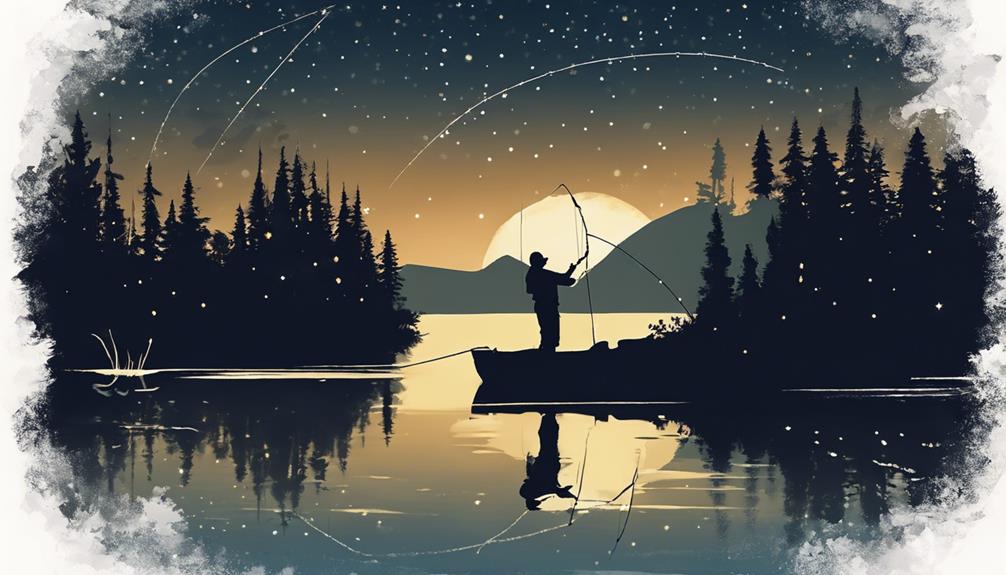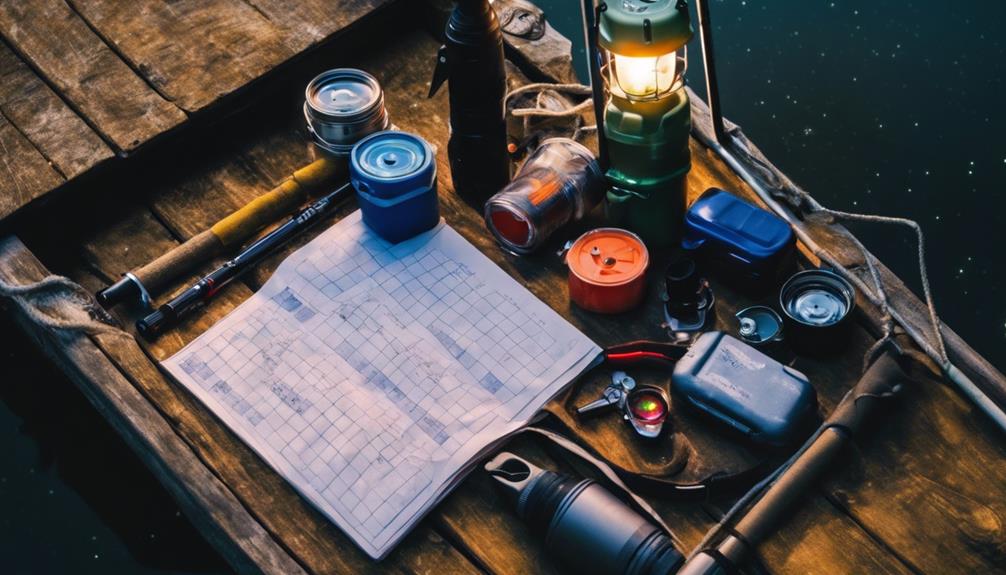To succeed in saltwater night fishing, prioritize optimal conditions like late evening hours, full moons for active fish, and calm seas. Position yourself strategically during tide changes and near underwater structures to attract predator fish. Equip yourself with lighted bobbers and choose bait wisely based on species preferences. Ensure proper gear maintenance and stay hydrated for peak performance. Embrace safety measures, respect marine life, and practice patience. Stay vigilant for weather changes and potential encounters with marine animals. Remember, mastering these tips can lead to a successful night fishing outing.
Best Time to Fish
For optimal results, fish during the late evening or early morning hours when the tide is moving. The success of your saltwater night fishing expedition can be greatly influenced by various factors such as lunar phases, weather conditions, tide patterns, and moonrise timing.
Lunar phases play a crucial role in the behavior of marine species. During a full moon, fish tend to be more active and feeding throughout the night. On the other hand, during a new moon, when the sky is darker, predatory fish may be more inclined to hunt closer to shore. Understanding these lunar cycles can give you an advantage when planning your fishing trips.
Weather conditions also impact your fishing experience. Calm seas and clear skies are ideal for night fishing as they provide better visibility and make it easier to spot fish. However, overcast skies or light rain can sometimes trigger feeding frenzies among certain species, so it's essential to adapt your strategy based on the weather forecast.
Tide patterns are another critical factor to consider. Fish are more active when the tide is moving, whether it's incoming or outgoing. Fishing during the change of tides can increase your chances of catching a variety of species. Additionally, timing your fishing trip around moonrise can lead to more productive outings, as many fish species are known to be more active during this period.
Location Matters
Selecting the right fishing location is crucial for maximizing your chances of success during saltwater night fishing expeditions. When it comes to night fishing in saltwater, the location you choose can significantly impact your catch rate. Consider the following factors to ensure you're in the best spot to reel in those big catches:
- Moon Phase: The moon phase plays a vital role in determining fish behavior at night. During a full moon, fish are more active and tend to feed more aggressively. Therefore, fishing in areas with ample moonlight can increase your chances of success. On the other hand, during a new moon, when visibility is limited, fishing in well-lit areas or using artificial lights becomes essential.
- Water Clarity: The clarity of the water is another critical factor to consider when selecting a fishing location. Fish rely heavily on their sense of sight to hunt for prey at night. Choosing areas with clear water will make it easier for the fish to spot your bait or lures, increasing your chances of getting a bite.
- Underwater Structure: Look for locations with underwater structures such as reefs, rocks, or vegetation. These structures provide shelter for baitfish, which in turn attract larger predator fish looking for a meal.
- Tidal Movements: Pay attention to the tidal movements in the area you plan to fish. Fish are more active during tidal changes, making these periods prime times for fishing. Position yourself strategically to take advantage of the incoming or outgoing tides for a successful night fishing experience.
Use Lighted Bobbers
When engaging in saltwater night fishing, incorporating lighted bobbers into your gear setup can significantly enhance your fishing experience and increase your chances of success. Bobber visibility plays a crucial role in night fishing techniques, allowing you to easily track your line amidst the darkness and detect even the slightest movements indicating a bite.
Lighted bobbers are designed with a small battery-operated light that illuminates the bobber, making it visible in low-light conditions. This increased visibility is essential when fishing at night, as it helps you monitor your line and detect bites more effectively. The bright light emitted by the bobber stands out against the dark water, ensuring you don't miss any subtle movements.
Incorporating lighted bobbers into your night fishing arsenal is simple and can have a significant impact on your catch rate. By using these specialized bobbers, you can adapt your usual fishing techniques to the challenges of fishing in the dark. Whether you're targeting specific species or simply enjoying the tranquility of night fishing, having a lighted bobber on your line can make a world of difference in your overall fishing experience.
Choose the Right Bait
To optimize your saltwater night fishing success, the key is selecting the appropriate bait for the specific species you're targeting. When choosing the right bait, consider the following tips for a successful night fishing experience:
- Understand the Target Species: Different fish species have varying feeding habits and preferences. Research the specific species you aim to catch to determine the most effective bait to use.
- Consider the Water Conditions: Factors such as water temperature, clarity, and current can influence the fish's behavior. Select baits that are suitable for the prevailing conditions to attract more fish.
- Use Natural Baits: Nighttime fishing often requires a more subtle approach. Natural baits like shrimp, squid, or small baitfish are excellent choices as they mimic the fish's natural prey.
- Experiment with Lure Presentation: Sometimes, how you present the bait can be just as important as the bait itself. Try different retrieval speeds, depths, and movements to find the most effective presentation for the target species.
Optimal Tides
Consider the influence of tidal movements on fish behavior when planning your saltwater night fishing excursions. Tides play a crucial role in determining the best times to fish, especially during the night. Understanding how tidal patterns affect fish activity can significantly increase your chances of a successful fishing trip.
Moon phases have a direct impact on tidal movements, affecting the behavior of fish. During full and new moon phases, tides are typically stronger, leading to increased water movement. This movement stirs up baitfish and other prey, making it an ideal time for predatory fish to feed. Therefore, targeting your saltwater night fishing trips around these moon phases can result in more active fish and better chances of catching your desired species.
In addition to moon phases, weather conditions can also influence tidal movements and fish behavior. Stormy weather or low-pressure systems can cause more extreme tides, creating feeding opportunities for fish. However, adverse weather conditions can make fishing more challenging and potentially dangerous during the night. It's essential to consider both the tidal movements and weather forecasts when planning your saltwater night fishing expeditions to maximize your chances of success.
Safety First
Ensuring safety protocols are meticulously followed is paramount for a successful saltwater night fishing expedition. When venturing out into the dark waters, being prepared for emergencies, navigating with clear night vision, and understanding potential wildlife encounters and changing weather conditions are crucial elements for a safe and enjoyable experience. Here are some essential safety tips to consider:
- Emergency Preparedness: Always carry a well-stocked first aid kit, a fully charged cell phone or radio for communication, and inform someone on land about your fishing plans and expected return time. Being prepared for unexpected situations can make a significant difference in emergencies.
- Night Vision: Invest in high-quality headlamps or portable lights with red lenses to preserve your night vision while providing sufficient illumination for tasks. Red light is less likely to spook fish or disrupt your ability to see in the dark.
- Wildlife Encounters: Be aware of your surroundings and respect the marine life. Avoid shining bright lights directly into the water to prevent disorienting sea creatures. Stay vigilant for potential encounters with stingrays, jellyfish, or other marine animals.
- Weather Conditions: Keep a close eye on weather forecasts before and during your fishing trip. Sudden changes in weather can pose risks, especially at night. Be prepared to seek shelter if conditions deteriorate rapidly to ensure your safety on the water.
Be Patient
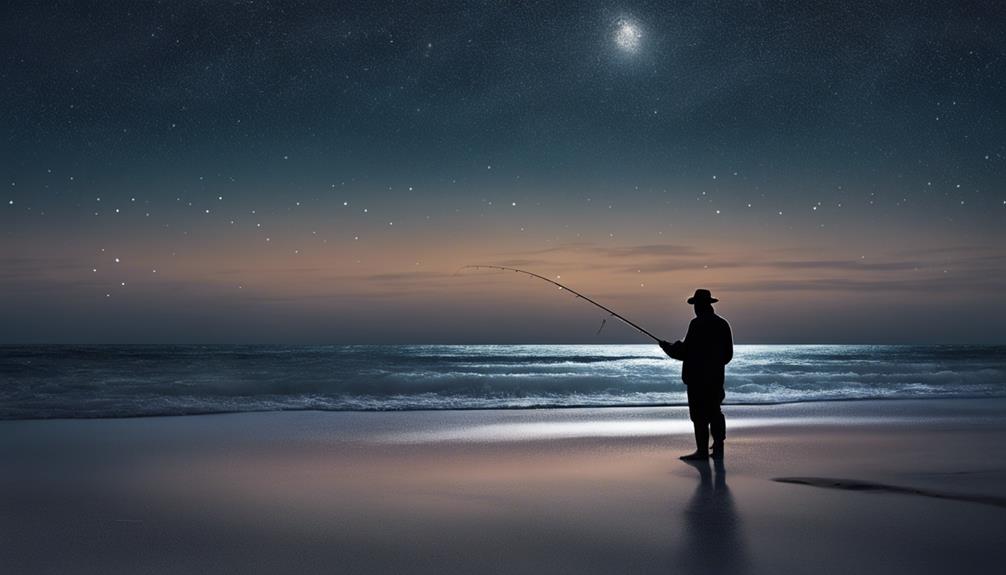
Remaining patient during saltwater night fishing is essential for increasing your chances of a successful catch and maximizing your overall experience. Practice mindfulness by focusing on the present moment and the sensations around you. Saltwater night fishing requires a different level of patience compared to daytime fishing due to limited visibility and the need to rely more on other senses. Embrace the solitude of the night, allowing yourself to connect with nature and experience the peacefulness that comes with fishing under the stars.
Being patient involves understanding that fish behavior can vary at night, requiring you to wait longer for bites. Avoid the temptation to constantly change spots or baits; instead, give each location sufficient time for the fish to notice your offering. Remember, fish can sense impatience, so stay calm and composed throughout your fishing expedition.
Enjoying solitude during saltwater night fishing can be a rewarding experience. The quietness of the night, broken only by the sounds of the waves and distant wildlife, can be therapeutic. Embrace the opportunity to disconnect from the hustle and bustle of daily life, allowing yourself to unwind and fully immerse in the fishing experience. By practicing mindfulness and enjoying the solitude that night fishing offers, you not only increase your chances of a successful catch but also enhance your overall well-being.
Avoid Overcrowded Areas
To optimize your saltwater night fishing experience, selecting fishing locations away from overcrowded areas is paramount for increasing your chances of a successful catch. When choosing a spot for night fishing, consider the following:
- Night Visibility: Overcrowded areas can lead to an increase in artificial light sources, which can disrupt your night vision. By avoiding crowded spots, you can enhance your ability to see in the dark, making it easier to spot fish and react to bites swiftly.
- Fishing Etiquette: Being in an overcrowded area can sometimes lead to conflicts over space, fishing lines, or catch. By choosing a quieter spot, you can enjoy a more peaceful fishing experience, free from unnecessary distractions or potential disputes with other anglers.
- Reduced Competition: Fishing in less crowded areas can reduce competition for fish. Overcrowded spots are often heavily targeted by multiple anglers, leading to depleted fish populations in those areas. By venturing away from the crowds, you may find more opportunities to catch fish that are less pressured and more willing to bite.
- Safety Concerns: Fishing in crowded areas at night can pose safety risks, especially if visibility is reduced, and there's a higher chance of tangling lines or hooks with other anglers. Choosing a less crowded location can help minimize these risks and ensure a safer fishing experience overall.
Keep Noise to a Minimum
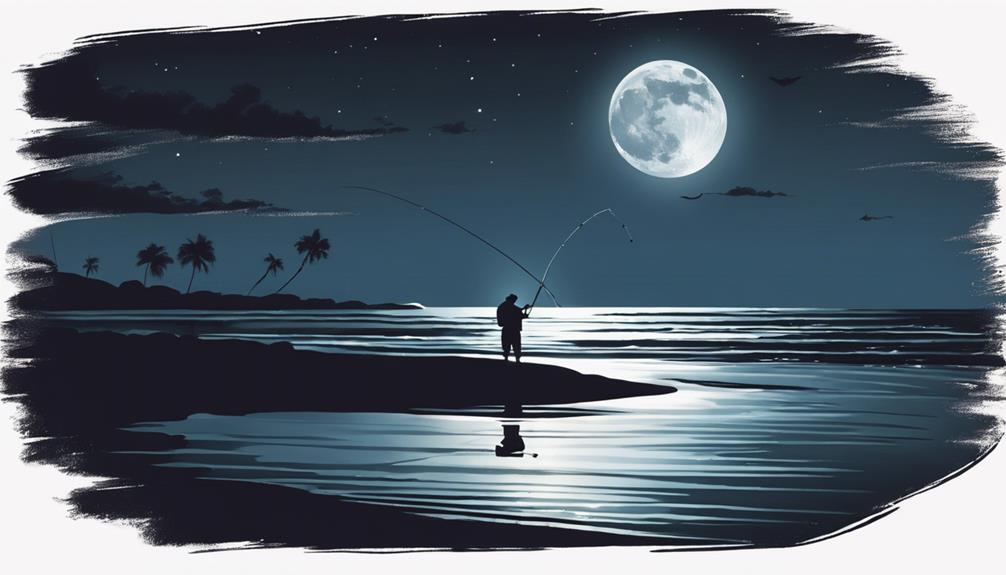
Minimize any unnecessary noise disturbances during your saltwater night fishing excursions to maintain a tranquil environment conducive to successful catches. Creating a quiet environment is crucial as fish have heightened sensitivity to sound in the water. To achieve this, strategic positioning away from noisy areas such as boat traffic or crowded fishing spots is essential. Position yourself where the fish are likely to be without disturbing their natural habitat.
Light discipline is paramount in maintaining stealth during night fishing. Excessive light can't only scare away fish but also attract unwanted attention from other anglers. Use dim red lights instead of bright white ones, as red light is less likely to spook fish and is harder for them to detect. Ensure your equipment is equipped with red filters to maintain low visibility.
Adopt a stealthy approach when moving around your fishing area. Walk softly on the boat or shore to avoid creating vibrations that can travel through the water and alert fish to your presence. Keep conversations hushed and avoid unnecessary movements that could disturb the peace of the night. By minimizing noise and staying stealthy, you increase your chances of a successful saltwater night fishing expedition.
Proper Gear Maintenance
Maintaining proper gear maintenance is essential for ensuring optimal performance and longevity during your saltwater night fishing expeditions. Neglecting your gear can lead to malfunctions and missed catches. To keep your equipment in top shape, follow these crucial steps:
- Rod Care: After each fishing trip, rinse your rod with fresh water to remove any salt deposits that can cause corrosion. Check for any signs of wear and tear, such as loose guides or cracks, and address them promptly to prevent further damage.
- Reel Maintenance: Clean your reel regularly by removing any dirt or sand that may have accumulated. Apply a few drops of reel oil to lubricate the moving parts and ensure smooth operation. Check the drag system for proper functioning and adjust if necessary.
- Line Inspection: Examine your fishing line for any signs of abrasion, nicks, or fraying. Replace the line if needed to avoid breakage during crucial moments. Stretch the line gently to test for any weak spots that could lead to failure.
- Hook Sharpening: Sharp hooks are essential for secure hooksets, especially in low-light conditions. Use a hook sharpening tool to maintain a razor-sharp point on your hooks. Regularly check for bluntness and sharpen as needed to increase your chances of hooking and landing fish successfully.
Stay Hydrated
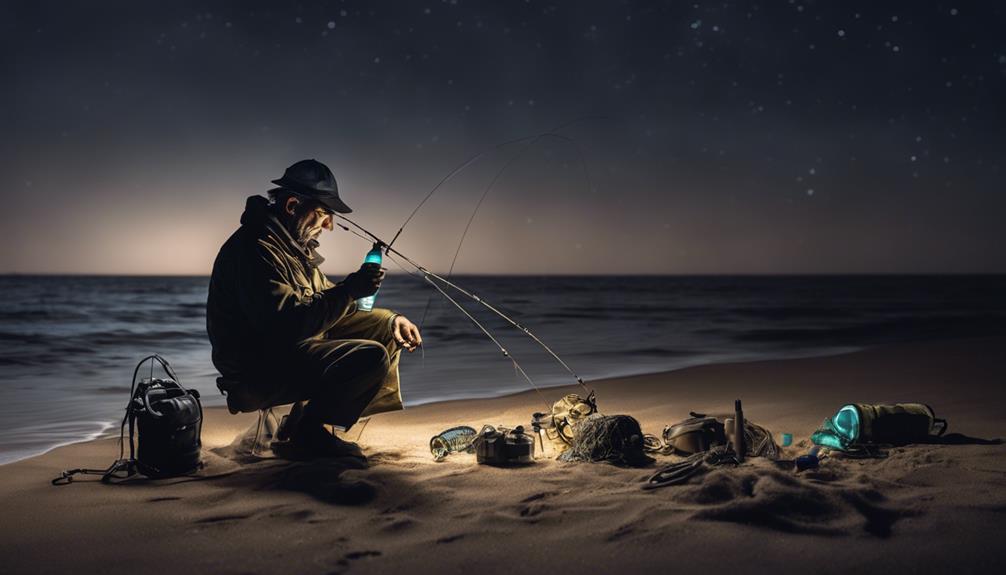
Proper hydration is crucial for optimizing your performance and focus during saltwater night fishing expeditions. Water intake plays a vital role in maintaining your overall well-being while out on the water at night. Dehydration can lead to a decrease in cognitive function, coordination, and endurance, all of which are essential for a successful fishing trip.
When engaging in saltwater night fishing, it's easy to forget to drink water regularly. However, staying hydrated is key to combating the effects of nighttime conditions such as cooler temperatures and increased humidity. Lack of water intake can't only affect your physical performance but also impact your night vision. Dehydration can make it harder for your eyes to adjust to the darkness, potentially hindering your ability to spot fish and navigate the waters safely.
To ensure you remain adequately hydrated during your saltwater night fishing adventure, make a conscious effort to drink water consistently throughout the trip. Pack enough water to last you through the night and take regular sips even if you don't feel thirsty. Maintaining proper hydration levels won't only enhance your performance but also support your night vision, giving you a competitive edge when seeking out those elusive saltwater catches.
Frequently Asked Questions
How Can I Attract Fish to My Bait in the Dark?
To attract fish to your bait in the dark, use scented baits and glow sticks. Scented baits release odors that draw in fish, while glow sticks provide visibility in low light conditions.
The combination of these two tactics increases the chances of attracting fish to your bait during nighttime fishing sessions. Experimenting with different scents and placement of glow sticks can help optimize your fishing success in saltwater environments after the sun sets.
Are There Specific Lures That Work Better at Night?
When fishing at night, certain lures can be more effective due to the decreased visibility. Factors like moon phase and tides play a role in determining the best lures to use.
Bioluminescent baits are particularly attractive to fish in low light conditions. Considering these elements can help you choose the right lures for your night fishing expedition.
What Safety Precautions Should I Take During Night Fishing?
When night fishing, safety precautions are crucial to ensure a successful and secure experience. Key precautions include having proper night fishing equipment, such as a reliable light source and a first aid kit.
Utilize proper lighting techniques to enhance visibility and prevent accidents. Always wear a life jacket, inform someone of your location, and be aware of potential hazards in the water.
Is It Necessary to Use a Specific Type of Fishing Line for Night Fishing?
When night fishing, using a specific type of fishing line is crucial due to low visibility concerns. Opt for lines designed for night fishing, often in bright or luminescent colors, to increase visibility in the dark.
Fluorescent or glow-in-the-dark lines can help you track your line's movement and detect bites more easily. Choosing the right night fishing line can significantly enhance your overall fishing experience and increase your chances of success in dimly lit conditions.
How Can I Navigate the Water in the Dark Without Getting Lost?
To navigate the water in the dark without getting lost, you can rely on technology such as GPS devices or fish finders with built-in maps. Utilize navigation techniques like plotting your course beforehand, using landmarks, and paying attention to the direction of currents.
Always have a reliable light source and know how to interpret it for guidance. By combining technology and navigation skills, you can safely navigate the dark waters while night fishing.
Conclusion
In conclusion, implementing these proven tips for successful saltwater night fishing can greatly increase your chances of a successful catch.
By considering the best time to fish, location, using lighted bobbers, choosing the right bait, optimal tides, avoiding overcrowded areas, minimizing noise, maintaining proper gear, and staying hydrated, you can optimize your fishing experience.
Remember to plan ahead and be prepared for a night of productive fishing.
